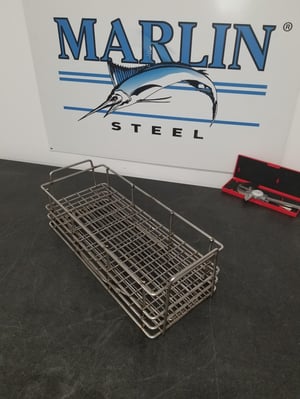 Automotive parts cleaning processes can vary wildly from one part to the next. For example, some parts used in the automotive industry are large and durable, needing massive, heavy-duty containers to hold them through rough and tumble high-pressure wash processes. Meanwhile, other parts can be small and delicate to the point that the faintest scratch could ruin the part.
Automotive parts cleaning processes can vary wildly from one part to the next. For example, some parts used in the automotive industry are large and durable, needing massive, heavy-duty containers to hold them through rough and tumble high-pressure wash processes. Meanwhile, other parts can be small and delicate to the point that the faintest scratch could ruin the part.
For this reason, many automotive manufacturers require versatile parts washing tools, and a wide variety of custom parts cleaning baskets as well. One automotive manufacturing company recently reached out to Marlin Steel to create a set of custom automotive ultrasonic cleaning baskets for use with a Dürr EcoCWave cleaning system.
What the Manufacturer Needed
This particular cleaning system was highly customizable, able to tackle several different kinds of cleaning operations in quick succession. Consequently, the baskets to be used with it had to be able to withstand a variety of different cleaning processes while protecting the parts they would hold.
Since many different kinds of parts with different shapes and sizes would be held through this process using precise placements for each part, the client needed to have a variety of different baskets made. Also, the maximum load for each basket would be 35 kilograms (77.2 pounds).
Rounding out the list of requirements were the client’s specific requests for the quality of welds in their baskets. For these custom baskets, all welds needed to:
- Be free of weld splatter;
- Have additional MIG (GMAW) or TIG (GTAW) weld reinforcement surrounding any resistance welds; and
- Be smooth to the touch (free of sharps or burrs that could harm operators or catch/store contaminants in the wash cycle).
Meeting the Client’s Requirements
The first challenge—making sure the baskets could survive repeated, prolonged exposure to the different washing modes of the client’s machine—was one of the most important ones to overcome for the long-term viability of the baskets being made. Because of the variable types of chemicals that could be used in each wash process, the material of the basket needed to have a strong general resistance to corrosion.
So, stainless steel alloys were considered the best fit for the client’s parts washing requirements. Because the chemicals used in the wash process would change depending on the parts being processed, and each basket was meant for a different set of parts, the specific grade of stainless steel used varied from one basket to the next.
To further enhance each basket’s resistance to chemical attack—and to eliminate any burrs or sharps that might be incidentally created by the cutting, shaping, and welding of the wires—each basket would be electropolished. The electropolishing process removes any excess material from the surface of a piece of metal to leave a microscopically-smooth surface that’s free of any defects. Doing so can greatly enhance a part’s resistance to chemical attack and breaks from tiny surface fractures (micro-fissures).
While somewhat heavy for manual handling purposes, the maximum load weight of 35kg that the client specified was still not much considering the tensile strength of most stainless steel alloys. Because of this, even relatively thin steel wires could easily support the weight of a maximum-capacity load.
The bigger challenge would be meeting all of the client’s specific requirements regarding welds. Normally, to minimize weld splatter on a stainless steel wire form, Marlin Steel’s degreed engineers would specify the use of resistance welds. These welds typically produce superior results in stainless steel wire forms.
However, the client specifically wanted to use GMAW (gas metal arc welding) or GTAW (gas tungsten arc welding) welds to join each piece of wire (excepting the fine wire mesh for each basket, where the filler material from the MIG welding process could block openings). Each weld also needed to be able to meet the client’s requirements prior to being electropolished—the welds had to be clean and strong on their own without relying on electropolishing to bring them into acceptable condition.
This is where Marlin’s use of factory automation proved to be helpful. Using a combination MIG/TIG welding machine, Marlin’s production team could produce incredibly consistent welds that had minimal splatter. Additionally, Marlin’s deburring machines were able to grind down the largest sharps, burrs, and other irregularities before passing the baskets through the electropolishing process.
Finally, each basket design was thoroughly tested using physics simulation software prior to manufacturing—this would help to spot any potential problems with each design early on without the need to wait for physical prototypes to be assembled, shipped, and tested over the course of weeks or months to verify their efficacy.
In the end, Marlin was able to produce a series of different custom ultrasonic cleaning baskets for the client—ones that met or exceeded all of their specifications. Need a custom wire form that can meet tight tolerances as soon as possible? Contact Marlin Steel to get a quote today!



.gif)


